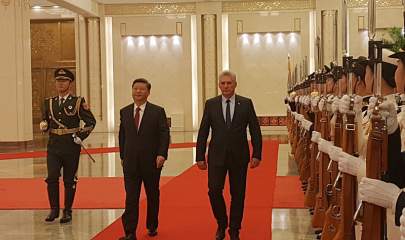China in Cuba!
Monday, June 12, 2023
Written by Laurence F Sanford, Senior Analyst ASCF
Categories: ASCF News ASCF Articles

China is paying Cuba billions of dollars for the right to build a spy station to gather signals communications intelligence against the United States according to the Wall Street Journal, . Cuba is just 90 miles off the coast of Florida. The spy base will be able to sweep electronic signals from the southeastern area of the U.S., which is home to many military bases and space launch facilities.
John Kirby, spokesperson for the National Security Council, said the report was “inaccurate” without detailing its inaccuracy. The Cuban embassy called it “mendacious,” the Chinese Embassy had “no comment.”
China is reciprocating U.S. signals intelligence gathering against China from military bases in South Korea, Japan, Okinawa, and the Philippines. The U.S. also gathers intelligence through ships and airplanes transiting the South China Sea and Taiwan Strait, which China claims as territorial waters. International organizations or neighboring countries do not recognize Chinese claims to these waters.
China buzzed a U.S. Air Force US RC-135 Rivet Joint reconnaissance aircraft in an “unnecessarily aggressive maneuver” while transiting through the South China Sea international air space on May 26. On June 4, the U.S. guided-missile destroyer Chung-Hoon was forced to slow down to avoid a collision in the Taiwan Straits. China claims the U.S.’s provocative and dangerous moves in its territorial waters and air space cause maritime security issues.
Guantanamo Bay U.S. Naval Base (Gitmo) at the southeastern tip of Cuba is a consistent source of Cuban protests. The base has been under U.S. control since the Spanish American War and has been under a treaty with Cuba since 1903 with no expiration date. Cuba claims the treaty was imposed under force and is illegal under international law. China supports the Cuban position.
Cuba, in 1960 was the first Latin American country to recognize the Chinese Communist Party (CCP) rule in China. Now all of Latin America, except Belize, Guatemala, and Paraguay, recognize the CCP. Two-thirds of Latin American countries are ruled by socialist leaders friendly towards China, though most are careful not to antagonize the United States openly due to essential trade relations.
The Belt and Road Initiative (BRI) cooperation between China and Cuba was reaffirmed in November 2022 in a meeting between President Xi of China and President Diaz-Canel of Cuba. They agreed to cooperate on issues of mutual interest, such as Cuba’s support of the One China policy (Taiwan is part of China) and China’s support in ending embargoes against Cuba. Major BRI infrastructure projects in Cuba include renewable energy and port facility improvements. China is Cuba’s largest trading partner, with Cuba exporting nickel and sugar and China exporting manufactured goods.
Cuba has had nearly $5 billion in debt forgiven by China. In 2015 the Paris Club forgave $8.5 billion of the $11 billion owed. Cuba’s finances are considered state secrets, and the current total debt owed is not known.
Cuba has suffered from totalitarian communism and a U.S. embargo since the 1960s. The people are poor and suffer the usual depredations of communism --- poor food, shabby housing, poor medical care, lack of free speech, religious and political persecution, and police state suppression. To those who argue that Cuba is a socialist paradise, one only needs to ask how many people have died fleeing to Cuba versus how many people have been killed fleeing from Cuba. Death estimates for those running range from 11,000 to 70,000. Death estimates for those migrating to Cuba range from 0 to 0.
Totalitarian ideologies such as communism, fascism, and Islamism are like mushrooms. They thrive in dark, dank, and dirty environments. Exposure to light causes mushrooms and totalitarian ideologies to shrivel and shrink, ultimately ending up on the “ash heap of history.” President Reagan used the term “ash heap” in his speech before the British Parliament in June 1982 to describe the future fate of communism in the Soviet Union. Bringing darkness to Western civilization is Marxist cancel culture shouting down free speech in universities and Islamophobia accusations shouting down discussions on Islamic atrocities.
Summary
China is led by the CCP, whose goal is world domination. The United States is the main obstacle to achieving this goal. China is increasing its “gray zone” activities worldwide, with Cuba a high priority due to its proximity to the U.S.
Insanity is described as doing the same thing over and over and expecting a different result. The United States has maintained an embargo against Cuba for over sixty years to change Cuba’s behavior. How has that worked out? Cuba has used the embargo for sixty years to justify its repressive control.
The world in general, and Latin America in particular, have condemned the U.S. policy as bullying. The U.S. should lift the embargo and let the light flow into Cuba. The Marxist ideology will start to shrivel.
The United States should also leave Guantanamo. How would America like it if a foreign power occupied a section of Long Island or the Florida Keys? The Gitmo prison is a disgrace to American values. We are holding terrorists offshore for years without trial because we are afraid to bring them onto American soil and, therefore, subject to our laws.
China is not going away. The United States must increase its “gray zone” activities built upon a strong military and economy.
Reciprocity to CCP actions is essential. Renew American civilization and stop indoctrinating our citizens with the Marxist ideologies of Woke, DIE (Diversity, Inclusion, and Equity), and Critical Race Theory (CRT).
Peace Through Strength!
Laurence F. Sanford
Senior Analyst
American Security Council Foundation
ascf.us




